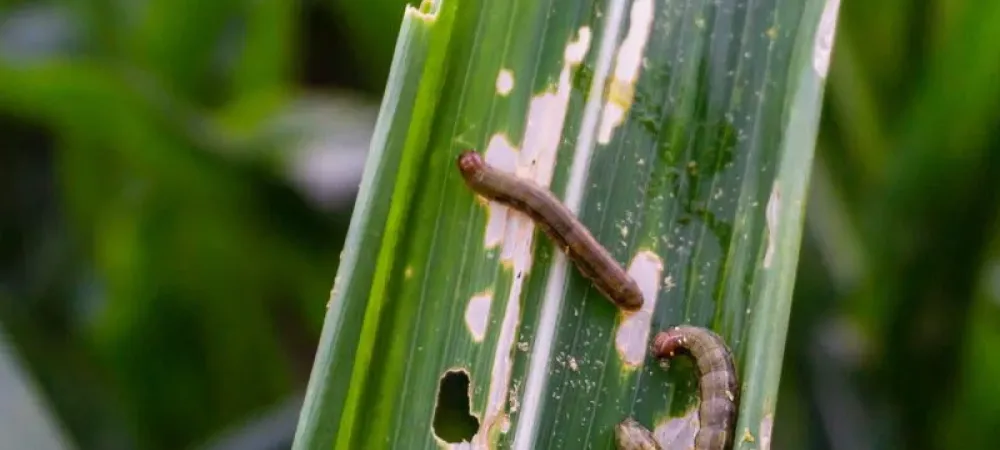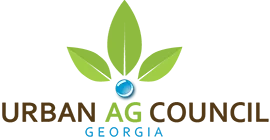Stop This Lawn Destroyer From Marching Onto Your Georgia Lawn

It’s that time of year again. If you have ever witnessed your garden plants skeletonized overnight, then you have probably seen the destructive power of the armyworm. They have a ferocious appetite, eating every grass blade in sight and stripping plants bare. The caterpillars feed at night, often making their damage go unnoticed. Tired of mowing your lawn? This could be the perfect solution. But if you like your Georgia yard and want to keep it the way it is, you may want to read on and learn everything you need to know about these lawn destroyers before your grass becomes their next feast.
Armyworm Identification and Behavior
Fall armyworms receive their name because they are often seen “marching” across golf courses, athletic fields, cornfields, and business and residential lawns. They can be found in every state, including right here in Georgia, where they usually appear in late August. Adult armyworms are dark grey with wings that contain light and dark splotches. They can easily be identified by the inverted “Y” marking on its face. Their larvae vary in color from dark greenish-brown to black. They have long, white, orange, and dark brown stripes along the length of their abdomen on each side. While they are especially attracted to fields of late-maturing corn, the mature armyworms will lay their eggs on any leaf blade of grass, fence, wall, storage, shed, and most damaging, your lawn. These hundred of eggs are laid in clumps of off-white clusters. When temperatures are warm, the eggs will hatch in five to 10 days.
Can Armyworms Cause Damage?
Once hatched, larvae stay close to their web-like nests within the grass. Here, they will feed on low-growing turf. Later in the season, they become mobile and start to climb up grass and other plants in search of food. While their favorite food is corn, the larvae or armyworms will feast on anything. They will munch on grasses such as Bermuda, St. Augustine, centipede, zoysia, and crops, including peanuts, corn, lettuce, cabbage, and soybeans. Because these sneaky devils do most of their damage at night, you will probably never know they are there until you see brown patches of lawn that grow bigger by the day. Other signs you may notice include:
Symptoms/Signs of Armyworm Damage
- Small brown patches
- Ragged grass blades that look as if they have been chewed upon
- Bare spots on your lawn
- Areas of scratched disturbed lawn
- Wildlife may start appearing that wasn’t there before, such as skunks and starlings that feed on armyworms
Armyworm Management
The key to managing armyworms is spotting them early before they have destroyed your lawn to the point of no return. There are several ways to treat armyworms.
Organic Approach
One of the safest approaches is using a harmless bacterial called Bacillus thuringiensis, also referred to as BT. The bacteria kills young caterpillars but will not work on mature caterpillars. BT is available in both liquid and powdered forms and will also eliminate other garden pests such as cabbage loopers, cabbage worms, tomato hornworms, cutworms, and others. To use, irrigate before treating, treat late in the afternoon, and, if possible, mow before you treat.
Use of Beneficial Insects
Several beneficial insects will help you win your war on armyworms.
- Parasitic wasps: These wasps may seem scary but are harmless to humans and feed on garden pests that love to feed on our plants.
- Ladybugs: Ladybugs can be purchased in bulk to be unleashed on destructive garden pests. Ladybugs will eat any armyworm eggs that they come across.
- Lacewings: Also, feed on the eggs of armyworms
Nematodes
Using nematodes to control armyworms and other lawn surface insects is becoming more popular. Nematodes are microscopic soil dwellers that love to feed on the larvae of many harmful and damaging insects, including armyworms. They are safe and easy to apply, work fast, and are cost-effective. The mode in which these worms work can be horrifying and unappealing to witness, so be sure you are aware and ready for the outcome before using them.
Hire a Professional Lawn and Pest Care Company
Because the damage from armyworms can often be mistaken for damage caused by other lawn surface insects, including grubs, we recommend hiring a local, professional lawn care company familiar with lawn pests and how to control them. Using nematodes can get messy, and insecticides only work if used appropriately and at a specified time of year—you're better off leaving something as important as your lawn in the hands of the professionals.
Eradicate Armyworms With Help From Environmental Turf Management
Get help! Leave the management and control of armyworms and other lawn surface pests up to the professionals! Environmental Turf Management offers insect control as part of our recurring lawn care in Loganville.



